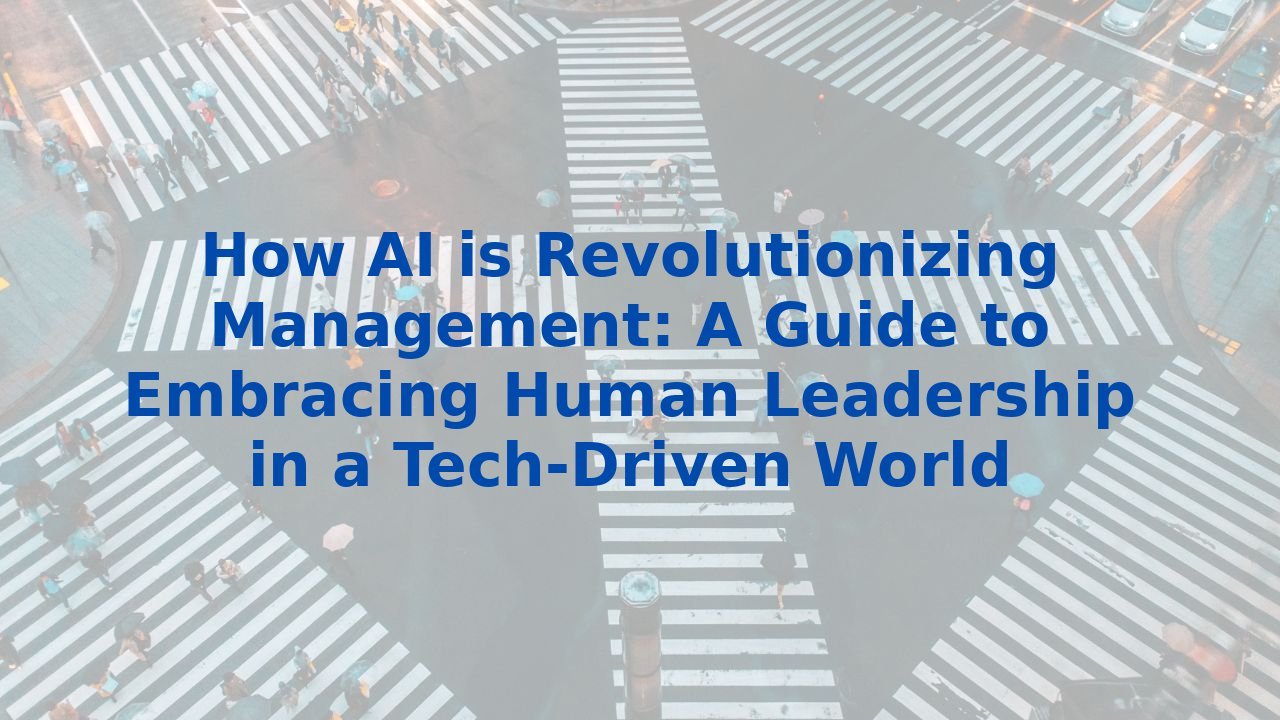How AI is Revolutionizing Management: A Guide to Embracing Human Leadership in a Tech-Driven World
The Evolution of Management: How AI is Revolutionizing Business Processes
Introduction
In the modern business landscape, the lines between management and leadership are becoming increasingly distinct. While management often focuses on maintaining the status quo, leadership must chart a course through uncertain waters. In this transformative age, artificial intelligence (AI) emerges as a powerful tool that not only enhances management tasks but also elevates the role of human leadership. This post delves into the ways AI is revolutionizing business processes, the substantial benefits of this technology, and the irreplaceable importance of human leadership in adapting to these changes.
The Role of AI in Business Processes
Today’s organizations are tapping into AI to streamline operations and create efficiency-driven environments. AI integrates seamlessly into various business processes, offering remarkable advantages:
- Automation: Routine tasks that consume valuable time can be automated through AI systems. From data entry to customer service chatbots, this automation liberates human resources to engage in creative and strategic endeavors, ultimately driving business value.
- Data Analysis: The ability of AI to analyze large datasets enables organizations to derive actionable insights. Machine learning algorithms reveal patterns, identify trends, and guide decision-making through data-driven predictions.
- Customer Experience: AI-powered solutions personalize interactions, providing tailored recommendations that enhance customer satisfaction. Whether in e-commerce or marketing, AI enhances the value of customer relationships.
- Predictive Maintenance: AI's capability in predicting equipment failures minimizes unexpected downtime. For industries reliant on machinery, such as manufacturing and logistics, this predictive model is vital for sustaining operational efficiency.
Benefits of AI for Improving Efficiency
The incorporation of AI into day-to-day business activities paves the way for incredible breakthroughs in efficiency:
- Enhanced Decision-Making: With AI providing analytical insights, decision-makers can base their strategies on factual data rather than intuition or guesswork. This paradigm shift greatly reduces human error and risk.
- Increased Productivity: AI’s ability to handle monotonous tasks allows employees to redirect their focus toward complex problem-solving and creative initiatives. This shift ultimately cultivates innovation within the organization.
- Cost Savings: Automating routine operations leads to substantial cost reductions. By minimizing manual efforts, organizations can optimize labor costs and enhance their bottom line.
- Improved Customer Service: The implementation of AI allows organizations to deliver customer support around the clock, ensuring customers receive prompt assistance and fostering loyalty.
The Importance of Human Leadership
As AI technology permeates the management space, the significance of human leadership cannot be overstated. Here’s why:
- Strategic Vision: AI systems, while adept at processing data, lack the ability to envision long-term goals. Human leaders bring a strategic perspective that aligns decisions with the overarching mission of the organization.
- Creativity and Innovation: The unique ability of humans to think creatively is something AI cannot replicate. Leaders are essential for fostering innovative solutions that diverge from conventional paths.
- Emotional Intelligence: Navigating team dynamics requires emotional intelligence, an innate human quality. Leaders possess the ability to resonate with team members’ feelings and motivations, a trait AI simply cannot emulate.
- Ethical Decision-Making: Human leaders are tasked with preserving the organization’s values and ethics in decision-making. While AI can be programmed to follow ethical guidelines, it cannot grapple with moral dilemmas the way human leaders can.
Training Employees for AI
As AI continues its transformation of business processes, equipping employees to work alongside this technology is crucial. Training should focus on several key areas:
- AI Literacy: Employees should grasp the capabilities and limitations of AI tools, fostering a productive collaboration between human intuition and AI logic.
- Data Analysis: Basic data analysis skills enable employees to interpret AI insights effectively. Understanding data visualization and statistical analysis can enhance their ability to leverage data-driven findings.
- Creativity and Problem-Solving: Developing critical thinking and creative problem-solving skills ensures that employees can push the boundaries of innovation, even in AI-saturated environments.
- Ethical Use of AI: Emphasizing ethical considerations, including data privacy and transparency, is essential in training programs for the responsible utilization of AI technologies.
Conclusion
The evolution of management through AI presents an unprecedented opportunity for organizations to enhance efficiency and effectiveness. However, embracing this technology does not negate the need for human leadership. A harmonious blend of AI’s analytical prowess with human intuition, creativity, and ethics will create a framework for success in this tech-driven world. To thrive in this evolving landscape, organizations must invest in empowering their workforce with the skills needed to navigate the AI revolution successfully. Discover more about how to train your employees for AI to ensure a seamless transition into the future.



